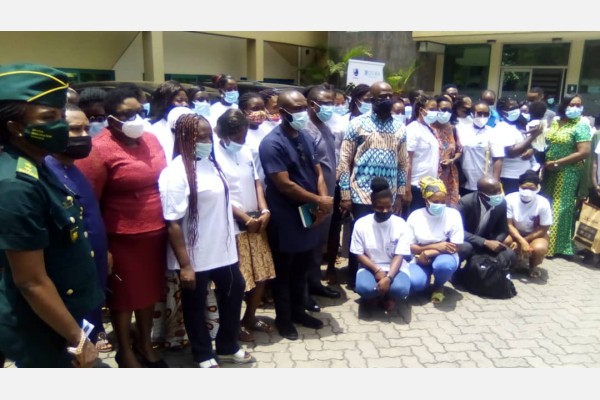Repository of Practices

Support to Female Migration Domestic Workers Resilience and Social Protection in Time of COVID-19 and Post-Pandemic
Secondary GCM Objectives
Dates
Type of practice
Geographic scope
Country:
Regions:
Sub Regions:
Local:
Summary
An increasing number of Ghanaians, particularly young men and women, travel out of the country in search of better employment opportunities. In recent times, there has been a surge in the numbers of low skilled workers, especially in the domestic and construction sectors migrating to the Middle East and the Gulf regions, even though the government’s ban on VISA -20 is still in force. The numbers that were brought in during the first phase of the Covid-19 through the government and via IOM attest to the fact that a lot more needs to be done beyond the ban on VISA-20. Under the auspices of the project "Support to Female Migration Domestic Workers Resilience and Social Protection in Time of COVID-19 and Post pandemic", Migrant Watch and Skilled Revolution Front aim at building the capacity of the returned migrants economically through psycho-social counselling, skilled trainings and provision of working tools.
Organizations
Main Implementing Organization(s)
Partner/Donor Organizations
Benefit and Impact
Between 5th May, 2021 and 11th May, 2021, the team set out to train the female migrant returnees in the chosen areas of household detergents & cosmetics, specifically, skills in chemical preparations and manufacturing of household mosquito repellent cream, bleach and medicated soap. A total of 51 beneficiaries participated in the skills training. At least 50% of the participants should be able to manufacture two of the three products correctly. They were taken through one full day of how to make paper boxes for packaging their products. The 3 days-training was conducted as preparation for self-employment and social integration model for the returnees. Handouts were given to each participant spelling out the right measurements and procedures in manufacturing each product. The trainer led the physical demonstrations (activity methods) involving all participants who were grouped in 7. Each member of the 7 groups performed a role in the manufacturing processes (division of labour) as it is a requirement. Equipment and materials have been procured but distribution of the same is yet to be done. The returnee migrants were asked to form groups of five each based on proximity of their respective communities. Ten groups of 5 were formed after the skills training workshop. They were encouraged to back and plan how to carry out their business operations as teams. The group leaders are expected to report to the MWSRF office in Accra with their respective plans, budgets and group bank accounts. It is expected that the groups will be given the necessary tools and chemicals they needed to set out to be part of the social entrepreneurship programme. This is aimed at improving the economic livelihood of the returnees and while engaging in malaria preventing programme of Ghana.
Key Lessons
Ghana is observed to be an enterprise economy. It is always near to impossible for entrepreneurs to work together successfully on group projects. In this project the returnee migrants discovered that working together comes with great benefits. In spite of the realization, they still doubt the possibility of working in groups for greater economic benefits. Bi-monthly field visits to returnees aimed at reviewing business plans, coaching, discussing their challenges and finding solutions are being incorporated to streamline their activities.
Recommendations(if the practice is to be replicated)
Innovation
Additional Resources
Media
Migrant Watch reintegrates over 50 irregular female migrants into society - Premtobre Kasee(21-1-22)
Date submitted:
Disclaimer: The content of this practice reflects the views of the implementers and does not necessarily reflect the views of the United Nations, the United Nations Network on Migration, and its members.
More Related Practices:
- Recruitment Cost Calculator (RCC)
- Research on human rights violations against live-in domestic workers, and related Code of Good Practice
- Migration Lab for the domestic and home care sector
- Domestic Workers League of ACV-CSC Brussels
- Ferias y actividades multitudinarias vinculadas a trabajo con organizaciones de base
Peer Reviewer Feedback:
*References to Kosovo shall be understood to be in the context of United Nations Security Council resolution 1244 (1999).
Newsletter
Subscribe to our newsletter.